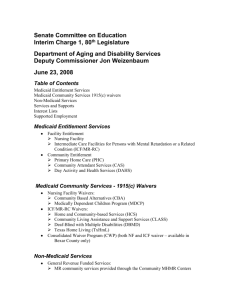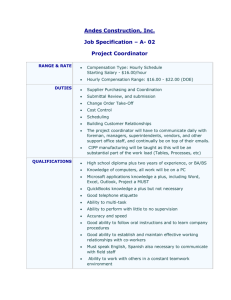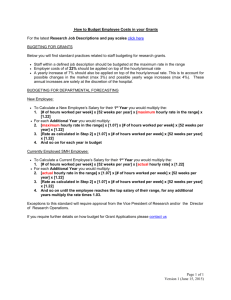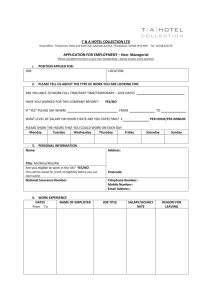Which Programs do What? - Texas Health and Human Services
advertisement
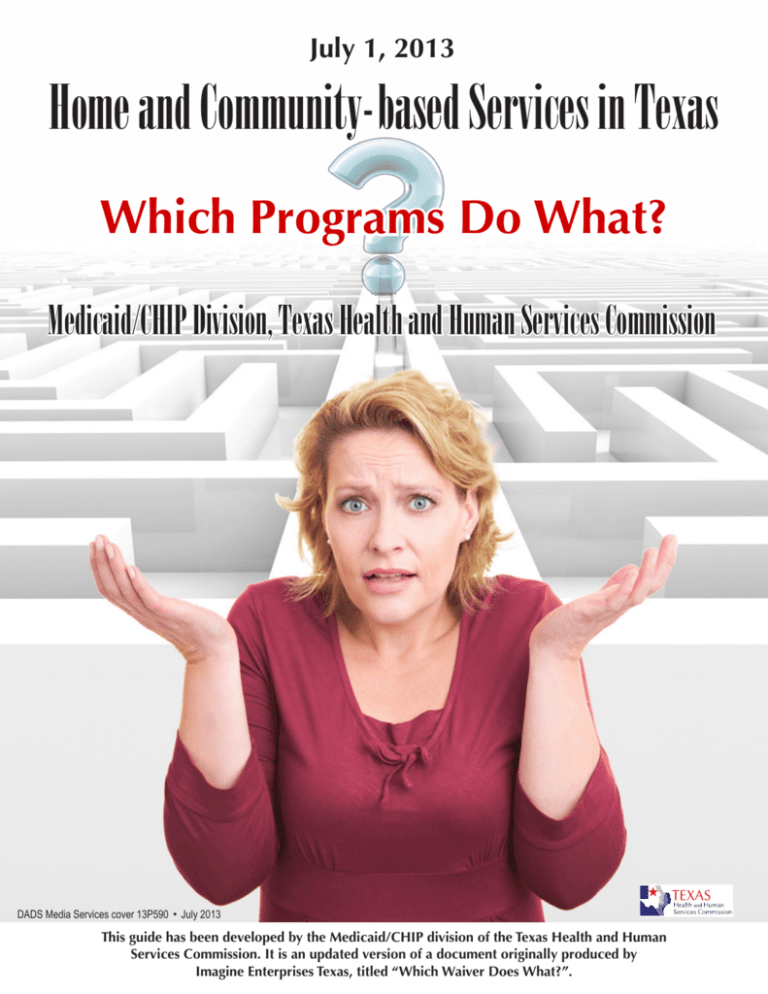
July 1, 2013 Home and Community- based Services in Texas Which Programs Do What? Medicaid/CHIP Division, Texas Health and Human Services Commission DADS Media Services cover 13P590 . July 2013 This guide has been developed by the Medicaid/CHIP division of the Texas Health and Human Services Commission. It is an updated version of a document originally produced by Imagine Enterprises Texas, titled “Which Waiver Does What?”. Introduction Home and community-based services help persons with disabilities, and some older persons, get the help they need to stay in their own homes and communities. Home and communitybased services programs provide alternatives to nursing homes or other institutional settings that are both more costly and place more restrictions on the people who live there. The programs and services discussed in this guide are available only to people in Texas who already have Medicaid or can qualify for Medicaid through the home and community-based services program. If you do not have Medicaid and would like to apply, you can do so at: www.YourTexasBenefits.com. This guide is written primarily for service coordinators, case managers, teachers, and others to use to talk with individuals with disabilities, individuals who are elderly, or parents of children with disabilities about home and community-based services programs in Texas. To participate in these programs, persons must be in the Texas Medicaid program or be eligible for Medicaid. We do not discuss here all of the programs that provide home and community-based services. Instead, we focus on the six that serve the largest number of people. These six are also the ones that provide the broadest array of services. Five of the six are available statewide. Each operates through a waiver that exempts them from certain state Medicaid requirements. You will also hear these programs and services referred to as “Medicaid waivers” or “waiver services.” Examples of services provided through home and community-based programs include: nursing, personal attendant services, habilitation, minor home modifications, dental services, respite, therapies, adaptive aids and supplies, and emergency response services. We have included a chart that shows which of the services is available in each of the six programs. Some things to keep in mind ……………………………………… The Health and Human Services Commission (HHSC) is the state Medicaid agency. It is responsible for developing and maintaining state Medicaid rules and policies, and assuring compliance with federal Medicaid standards. HHSC does not, however, administer the programs. The Department of Aging and Disability Services (DADS) administers all of the home and community-based programs discussed in this guide. An important resource for more information is the DAD’s publication “Access and Intake Services Community Options Booklet.” You can find it on the DADS website: www.DADS.state.tx.us/providers/community_options.pdf Because of funding limitations and the popularity of the programs, the number of people wanting these services generally exceeds the number that can be served. Most applicants will be put on an “interest list” until there is an opening. Therefore, it is important to apply as soon as one identifies that they or a family member may at some point need the services and supports it provides. The information in this guide could change at any time. For the most up-to-date information, go to the DADS website at www.dads.state.tx.us You can also send questions about any of these programs to DADS at: PDO@dads.state.tx.us. Program Overviews CBA Community Based Alternatives For: People with disabilities age 21 and over as a cost-effective alternative to institutional care in nursing facilities. Service Delivery: People receiving CBA services choose a Home and Community Support Services Agency (HCCSA) to provide basic services. If requesting assisted living or residential care, adult foster care, out-of-home respite services, emergency response services, or home-delivered meals, they also select providers for those services. Not available in STAR+ Plus service area CLASS Community Living Assistance & Support Services For: People of any age diagnosed with a related condition. CLASS is a cost- effective alternative to placement in an institution for people with disabilities. (Note: A related condition is a disability, other than an intellectual disability, that is acquired before age 22 and affects functioning in daily life.) Service Delivery: People receiving CLASS services choose one agency to provide case management and another direct service agency to provide all other CLASS services. DBMD Deaf Blind with Multiple Disabilities For: People who are both deaf-blind, or have a condition that results in deaf-blindness, and have another disability. DBMD is a cost effective alternative to placement in an institution. Services focus on increasing opportunities for people to communicate and interact with their environment. Service Delivery: Recipients choose from eligible providers for a variety of services. The DBMD provider provides case management services. HCS Home & Community-based Services. For: People of all ages diagnosed with an intellectual disability who are living with their family, in their own home, or in other community settings, such as a small group home. Service Delivery: People in HCS choose an eligible provider for a variety of services. Local authorities (often called community centers) provide service coordination. MDCP Medically Dependent Children Program For: Children below 21 who are at risk of placement in a nursing facility because of their complex medical needs and who also qualify for nursing facility services. Children 18or younger must live with a family member or a foster family that has no more than four children that are not relatives. Service Delivery: Children receiving MDCP services work with their DADS case manager to choose a Home and Community Support Services Agency (HCSSA) to provide basic services. TxHmL Texas Home Living Program For: People of all ages with an intellectual disability, related condition, or both, who live with their families or in their own homes. Service Delivery: People receiving TxHmL services work with a service coordinator from the local authority (sometimes called a community center) to plan services to help them continue living in their own or their family's home. Adaptive Aids & Medical Supplies ✔ Adult Foster Care ✔ Assisted Living ✔ ✔ Case Management ✔ ✔ ✔ ✔✽ ✔ ✔ ✔ ✔✽ Fixed hourly rate ✔ ✔ ✔ CLASS: Monthly fee DBMD: Hourly fee CBA & MDCP: No fee Service provided by DADS case managers Fixed hourly rate. ✔ ✔ Dietary/Nutrition ✔ ✔✽ ✔ ✔ ✔✽ ✔ ✔ ✔✽ ✔ ✔ ✔✽ ✔✽ ✔✽ ✔✽ ✔✽ ✔ ✔ ✔✽ ✔✽ For persons age 18 and older who get Family Services through CLASS. See “Service Definitions.” HCS: Fixed daily rate for Level Of Need (LON) TxHmL: Fixed daily rate DBMD: Hourly rate Actual cost. Service limits vary by program. Fixed hourly rate Fixed monthly rate Employment Assistance Service not provided if available through another source. Hourly rate Fixed daily rate ✔ Day Habilitation Financial Management Services Flexible Family Support Services Host Home/Companion Care Habilitation Foster home must be enrolled with Department of Aging and Disability Services (DADS). ✔ ✔✽ ✔ Actual cost of item. Service limits vary by program. ✔ ✔ Continued Family Services COMMENTS Fixed daily rate Individual See “Service Definitions” for pays room and board. differences in assisted living services in CBA and DBMD. assisted living services. Fixed hourly rate Community Support Emergency Response Services ✔✽ ✔ Chore Services Dental TxHmL MDCP HCS ✔ REIMBURSEMENT Fixed daily rate based on Level of Service (LOS). Individual pays room and board. Audiology Behavioral Support DBMD CLASS SERVICE CBA COMPARISON OF SERVICES Available as an adaptive aid in DBMD, CLASS, and TxHmL, but not a distinct service in those programs. ✔✽ Fixed hourly rate See Supported Employment and Prevocational Services for similar services in HCS and CLASS. ✔✽ Monthly rate For consumer-directed services employers. Fixed hourly rate Daily rate based on Level of Need (LON) All ages qualify. Fixed hourly rate * Indicates a service that can be self-directed through the Consumer Directed Services option. Home Delivered Meals TxHmL MDCP HCS DBMD CBA SERVICE CLASS COMPARISON OF SERVICES (continued) ✔ REIMBURSEMENT Per meal ✔✽ Intervener Fixed hourly rate Minor Home Modifications ✔ ✔ ✔ ✔ Nursing Services ✔ ✔✽ ✔ ✔ ✔✽ Actual cost with lifetime maximum that varies by waiver Fixed hourly rate Occupational Therapy ✔✽ ✔✽ ✔ ✔ ✔✽ Fixed hourly rate ✔✽ Prescriptions ✔ ✔✽ Fixed hourly rate ✔✽ ✔ ✔ ✔ ✔ ✔ ✔ ✔ ✔✽ Level of assistance based on person’s needs and plan of care. Fixed hourly rate. All prescriptions covered Unless the person is also eligible for Medicare. Actual cost. ✔✽ ✔ ✔ Social Work Specialized Therapies ✔ Daily rate based on Level Of Individuals pay room and board. Need (LON) ✔ ✔✽ CBA, CLASS, DBMD, MDCP: Fixed hourly rate HCS: Fixed daily or hourly rate ✔ Ranges from maximum 30 days per year in CBA, CLASS & DBMD to full annual spending level in MDCP. Provided by their local authority Fixed hourly rate Ceiling per hour** ✔ Includes auditory Integration or enhancement training, dietary/ nutrition, among others. ✔✽ ✔✽ ✔ ✔ ✔✽ Fixed hourly rate ✔✽ ✔✽ ✔✽ ✔✽ ✔✽ Fixed hourly rate A service for consumer-directed services employers. Fixed daily rate In CLASS, serves children age 18 and under. DBMD/HCS/TxHmL: Fixed hourly rate CLASS: Ceiling per hour** In HCS, can be provided in conjunction with Day Habilitation. Service maximums apply in HCS. Support Family Services ✔ Supported Employment ✔ ✔ ✔ ✔✽ ✔ Supported Home Living Transition Assistance ✔✽ ✔ ✔✽ Rate based on qualifications of provider (4 levels based on experience and education) Fixed hourly rate Service Coordination Speech/Hearing/Language Services Support Consultation ✔ ✔ Prevocational ResidentialSupport/ Supervisesd Living Respite Care ✔ ✔ Orientation & Mobility Personal Assistance Services Physical Therapy COMMENTS ✔ ✔ ✔ Fixed hourly rate. ✔ A set one-time fee plus a service rate with a ceiling** ** Ceiling: The maximum amount the provider can be paid per unit of service. DEFINITIONS OF SERVICES Adaptive Aids and Medical Supplies: A variety of devices, controls, appliances or medical supplies that help people live more independently by giving them the ability to perform activities of daily living, as well as to communicate and to control their environment. Adult Foster Care: A 24-hour living arrangement in an adult foster care home enrolled with DADS. Services may include meal preparation, housekeeping, personal care, and help with transportation and activities of daily living. Individuals pay room and board. Assisted Living (DBMD): Provides help with daily living - giving medication, household chores, personal care, transportation, and 24hour supervision - in a group home setting with no more than six people. Individuals pay room and board. Assisted Living (CBA): A 24-hour living arrangement in a licensed personal care home. Services may include personal care, home management, social and recreational activities, 24-hour supervision, help with the administration of medicine, and transportation. Individuals pay room and board. Audiology: Provides a licensed audiologist to direct therapy and training, as well as to consult with the person receiving services, their family members, and service providers Behavioral Support: Services provided by a qualified professional to help people increase socially appropriate behavior and eliminate behaviors that are interfering with their inclusion in their home, family, or the community. Case Management: Services provided by a case manager including: assisting, creating and coordinating a service plan; monitoring the quality of services; advocacy; finding resources; making referrals; providing crisis intervention, and protecting people’s rights. Chore Services: Services to help people maintain their homes so they are both safe and clean. Services include tasks such as cleaning floors, windows and walls; securing loose rugs and tiles; and moving heavy items to provide safe access. Community Support: A wide range of personalized services in the home or other community locations to support activities of daily living, participation in typical community activities, job training, and helping develop and maintain relationships with friends, families and others who are not service providers. Continued Family Services: Support Family Services for persons age 18 and older in the CLASS program. (See definition of Support Family Services.) Consumer-Directed Services (CDS): Services that are directed by the person who receives them or, for a child, by the parent. Persons with CDS hire and manage the people that deliver their services. A Financial Management Services Agency (FMSA) they choose helps with payroll, training, and other support. The CDS option is available in all of these programs. Day Habilitation: Services during the day to give people opportunities to improve their self-help and social skills. These are important skills to live successfully in the community. Dental: Services provided by a dentist to preserve teeth and meet related medical needs. Services do not include cosmetic dentistry. Dietary/Nutrition: Services provided by a licensed dietician to determine basic or special nutritional needs. DEFINITIONS OF SERVICES (continued) Emergency Response Services: An electronic monitoring system for people who live alone or who are isolated in the community and may have difficulty calling for help in an emergency. In an emergency, they can press a button to signal for help. Employment Assistance: Help locating paid employment in the community by helping identify interests, evaluating skills and determining needed supports. Also help locate potential employers. Financial Management Services: Services that help people using the Consumer Directed Services option manage their payroll and budget. Flexible Family Support Services: Direct care and services provided to the person with a disability when primary caregiver is at work, job training, or school. Minor Home Modifications: Home modifications for accessibility—including bathroom modifications, doorway widening, and ramps—to enable people to live in their homes safely and securely. Nursing Services: Services provided by a licensed nurse to monitor health conditions, administer and monitor medication, make referrals for medical services, and training of the person needing nursing services, as well as their family members, and support personnel. Occupational Therapy: Skilled treatment to help people become as independent as possible. Services include assessing needs, developing a treatment plan, determining therapeutic intervention, training, helping with adaptive aids, and consulting with the family and provider. Foster/Companion Care Services: A home-like alternative to a group home available to people of all ages. Orientation & Mobility: Evaluating, planning and teaching independent travel skills to those with visual impairments so they can safely and effectively get around in their environment. Habilitation Attendant/Habilitation Training: Services for people living in their own or their family’s home to help them learn, retain, or improve daily living skills. Services can include activities such as personal grooming and cleanliness, making a bed, and household chores, preparing and eating food, and social and adaptive skills. (See Residential Habilitation Services in DBMD, Supported Home Living in HCS and Personal Assistance services in CBA.) Personal Assistance Services: Personal assistants help with activities of daily living and household chores necessary to maintain clean and safe home environments in community settings (except in adult foster care homes or assisted living facilities). Services may include protective supervision and help performing health-related tasks delegated by a registered nurse. Home Delivered Meals: Nutritious hot lunchtime meals delivered to homebound older adults and persons with diabilities. Physical Therapy: Helps people improve or maintain their physical functioning so that participating in daily tasks and activities is easier. Services include: assessing physical status and identifying needs, developing a treatment plan, helping with adaptive aids, and consulting with the person’s family and provider. Intervener: An intervener helps people with significant communication barriers participate in community services and activities by making sights, sounds, and activities accessible to them using their specific, personal communication system. Prescriptions: Medicines ordered by a doctor. Prevocational: Services to help people prepare for paid or unpaid employment with a focus on following rules and instructions, attendance, finishing tasks, problem solving, and safety. The services are not for a specific job. Services are typically provided in a group setting, such as a sheltered worksite or day activity center. Residential Support/Supervised Living Services: Supervision and assistance in a group home setting with staff who stay awake during regular sleeping hours. Respite Care: Direct care of a person in order to provide their caregiver temporary relief from care-giving activities. Service Coordination: Assistance provided to help an individual access services and supports needed to help achieve a quality life and participate in the community. Service maximum: The highest number of units of services (such as hours or days) typically allowed for a particular service. Not everyone who gets the same service has the same maximum. There are some variations based on a person’s needs and the care that is needed. Social Work: Helping someone identify their needs, and providing therapeutic intervention and training when needed. Specialized Therapies: A variety of therapeutic interventions designed to decrease inappropriate behaviors, as well as providing social opportunities. Specialized therapies include: musical therapy, recreational therapy, massage therapy, hippotherapy, therapeutic horseback riding, auditory integration therapy, nutritional services, and aquatic therapy. Speech/Hearing/ Language Services: Services for persons with speech, hearing, or language problems including assessing their needs, developing a treatment plan, helping with adaptive aids, and consulting with the person’s family and provider. Support Family Services: Services that allow people younger than 18 with a related condition to live in the home of a family other than the natural family or with adopted parents as an alternative to nursing homes or other institutions Support Consultation: Offers practical skills training and assistance to support consumer-directed services employers in areas such as recruiting, screening, and hiring service providers. Support consultation does not include budget, tax or workforce policy issues. Supported Employment: Provides ongoing support at a worksite to help an individual keep their job. The worksite must also employ people without disabilities. Services include adaptations, supervision and training, based on the person’s support needs. Supported Home Living: Helps people living in their own or their family’s home learn, keep, or improve daily living skills, including personal grooming, cleanliness, household chores, preparing and eating food, and social and adaptive skills. Transition Assistance Services: Services to help people transitioning from a nursing home or institutional setting into a home in the community by paying for one-time costs of setting up their new home. DADS Resources The best place for more information about Home and Community-based Services, including the six discussed here, and Medicaid in general is the DADS website (www.dads.state.tx.us). Information on how to apply for any of these programs is also available at this site. DADS Resources LocateWaiver the search box onResources the DADS home page and type in one of the terms below: Medicaid Information It will take you to: community options The Access and Intake Services Community Options Booklet. This is a “must have” for information about DADS’ programs and services (including the Home and Community-based Services programs) for older adults and people with disabilities. all services The All DADS Services page. Includes links to the programs described in this booklet, and many more programs. Hint: At the bottom of each program page, there’s a link to a page for providers in that program. The provider pages are also a good resource. services comparisons Comparisons of home and community-based services available in various programs. local authorities Links to information about local authorities, the point of entry for HCS and TxHmL. QRS The Long Term Care Quality Reporting System – Information to help you evaluate the quality of long term care providers. Consumer Rights and Services – Information about your rights including: •a phone number to call with concerns about the treatment of an older person or a person with a disability. •how to file a complaint. consumer rights We hope you have found this informational helpful. You are welcome to reproduce this document to share with others, as well as link to it on your own organization’s website.

